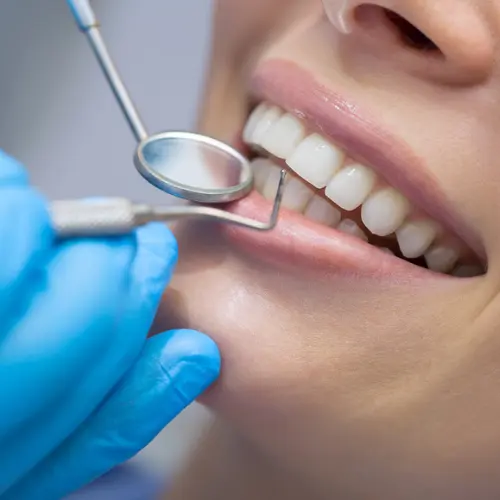Dental Cleaning
Preventive dental treatment designed to protect gum health, remove plaque buildup, and maintain a clean, healthy smile.
What is Dental Cleaning?
Dental cleaning is a professional preventive procedure that removes plaque, tartar, and surface stains from teeth and along the gum line. It plays a key role in preventing cavities, gum disease, and bad breath while supporting long-term oral health and helping patients maintain strong, natural teeth.

How does Dental Cleaning work?
Using specialized instruments and gentle techniques, plaque and tartar are carefully removed from tooth surfaces and below the gum line. The treatment is completed with polishing, leaving teeth smooth and clean while helping protect gums and reduce the risk of future dental problems.

Clinics That Offer Dental Cleaning

Durrës
St. Egnatia, Veliera, Durrës 2001

Tirana
St. Pjeter Budi

Tirana
Lake View Residences

Tirana
St. Sami Frasheri

Tirana
St. Ilo Mitke Qafzezi

Tirana
St. Medar Shtylla

Tirana
St. Fadil Rada

Vlorë
St. Sadik Zotaj

Durrës
St. Aleksander Goga

Tirana
St. Kavaja

Vlorë
St. Vlora

Vlorë
Ismail Qemali Boulevard, Vlorë

Vlorë
St.Haxhi Xhyherri

Tirana
St. Petro Korçari
Benefits of Dental Cleaning
Prevents cavities
Removes plaque and tartar that contribute to tooth decay and long-term damage if left untreated.
Protects gum health
Reduces inflammation and bacteria that can lead to gingivitis and periodontal disease.
Fresher breath
Eliminates odor-causing bacteria, helping maintain a clean, fresh feeling throughout the day.
Supports oral wellness
Promotes long-term dental health by preserving natural teeth and preventing future complications.
Dental Cleaning Cost Guide
Discover how choosing Albania for dental cleaning can save you money, with affordable treatments compared to the UK and Western Europe.
| Procedure Category | Typical Range (Albania, €) | Typical Range (UK/Western Europe, €) | You Save |
|---|---|---|---|
Standard Dental Cleaning | €30- €80 | €50- €120 | 60% |
Your Dentist in Albania
At Dental Tourism Albania, we help you get the right dental treatment for a healthy, confident smile.
We take the time to understand your needs and connect you with experienced dentists who can deliver the best results for you. We pick our partner clinics carefully, so you can feel confident about the quality of care you receive.
Everything is easier, more affordable, and designed around you.

Frequently Asked Questions
Everything you need to know about dental tourism in Albania
Is teeth fluoridation healthy?
Yes, fluoride is one of the best ways to strengthen your enamel and reduce your risk of cavities. Ask your dentist for product recommendations and how often you should get fluoride treatments.
Does tooth tartar cause bad breath?
Yes, on top of having an unusually unpleasant smell, it can also cause small pockets to form in areas between your teeth and gums. Bacteria and food debris can get trapped in there, resulting in bad breath and a bad taste in your mouth.
Why is tartar breaking off my teeth?
Occasionally, tartar can break off your teeth when you’re eating certain foods or brushing too aggressively. When this happens, it can leave a rough or sharp area behind. It might be tempting to remove more tartar on your own. But doing this can damage your teeth and gums.
Call your dentist if you notice tartar breaking off your teeth. They can remove the remaining tartar safely and effectively.

